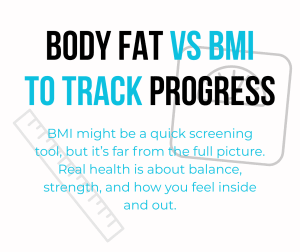
When it comes to tracking health and fitness progress, the scale often gets far too much attention. We’ve been taught that a lower number equals success, and that Body Mass Index (BMI) is the ultimate measure of health. But the truth is, BMI is a decades-old calculation that barely scratches the surface of what’s really happening inside your body. If you’ve ever felt discouraged by a “bad” BMI score or daily fluctuations on the scale, it’s time to take a closer look at what these numbers actually mean—and why they’re not the best indicators of health.
What BMI Really Tells You (and What It Doesn’t)
BMI is a simple calculation that uses your height and weight to categorize you as underweight, normal weight, overweight, or obese. It was originally designed for large-scale population studies, not for evaluating individual health. It doesn’t measure body fat, muscle mass, bone density, or overall fitness. Two people can have the exact same BMI and look completely different—or have vastly different levels of health.
For example, a professional football player with a lot of muscle might have a BMI that technically places him in the “obese” category, even though his body fat is low and his cardiovascular health is excellent. On the flip side, someone with a “healthy” BMI could actually have a high percentage of body fat and very little muscle mass, which can increase the risk of chronic diseases.
The Problem with Daily Scale Weigh-Ins
If you’ve ever stepped on the scale day after day, you know how frustrating those fluctuating numbers can be. Weight can vary by several pounds in a single day due to water retention, digestion, hormone cycles, and even stress. These shifts are completely normal, but when you fixate on the number, it’s easy to feel like you’re not making progress—when in reality, your body composition might be improving.
Daily weigh-ins can also fuel unnecessary anxiety and unhealthy relationships with food and exercise. Progress isn’t about what the scale says on any given morning; it’s about how your body feels, how your clothes fit, your energy levels, and other non-scale victories like better endurance, strength, or mobility.
Why Body Fat Percentage Tells a Better Story
Instead of focusing solely on BMI or the scale, looking at your body fat percentage provides a clearer picture of your health and fitness. This measurement tells you how much of your body is made up of fat compared to lean mass (muscle, bones, and organs). Tracking changes in body fat over time—especially when paired with strength training—can show real progress, even if the scale barely moves.
For example, if you start lifting weights and gain muscle while losing fat, your weight might not change much at all. But your body composition will shift dramatically—you’ll look leaner, feel stronger, and your metabolism will likely improve.
Examples of “Unhealthy” BMIs That Aren’t Unhealthy at All
Bodybuilders and Athletes: A competitive bodybuilder or sprinter might have a BMI well into the “overweight” category simply because muscle weighs more than fat.
Gymnasts and Martial Artists: Many athletes with compact, muscular builds have BMIs that are technically too high, despite being at peak performance levels.
The Reverse Situation: Someone with anorexia or who is chronically underweight might have a low BMI, but their body fat percentage could be dangerously high because they’ve lost too much muscle. This “skinny fat” situation is far riskier than the BMI chart suggests.
Stop Letting the Scale Define You
Your health isn’t summed up by a single number, and it’s certainly not defined by BMI alone. Instead of obsessing over the scale, start paying attention to the things that truly matter: how your body feels, how you’re getting stronger, your energy, your mental health, and your ability to live the life you want.
If you need a number to track, consider using tools like body measurements, progress photos, or a body composition test every few months instead of stepping on the scale every morning. Progress is a long-term journey—and the scale is just one tiny piece of the puzzle.
Final Thoughts
It’s time to shift the conversation from weight to wellness. BMI might be a quick screening tool, but it’s far from the full picture. Real health is about balance, strength, and how you feel inside and out. Don’t let an outdated metric or a fluctuating number steal your motivation. Instead, celebrate the small, meaningful wins—like lifting heavier weights, running farther, or simply feeling more confident in your own skin.



